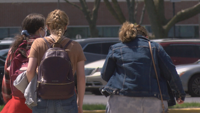ILLINOIS (WSIL) -- A Kankakee County judge ruled parts of Illinois' Safe-T Act is unconstitutional. The legislation calls to eliminate cash bail.
With Wednesday's ruling, portions of the Safe-T Act won't go into effect as previously planned on January 1 for 65 counties that signed onto the complaint. Those includedÌýFranklin, Jackson, Jefferson, Johnson, Massac, Perry, Pope, Pulaski, Randolph, Saline, Union and White Counties.
According to the Kankakee County State's Attorney, the ruling means the pre-trial release and bail reforms spelled out in the law will not take effect in those counties come Jan. 1.
Other parts of police accountability and training will still take effect on that date.
Kankakee County Circuit Court Judge Thomas W. Cunnington issued his mixed ruling that “declaratory judgment is proper in this case and that plaintiffs have met their burden to show to this court that [the SAFE-T Act] as they relate only to the pretrial release provisions are facially unconstitutional� while finding the state was successful in defending against challenges of alleged violations of the single subject rule and whether the bill was given proper public hearing.
On the cash bail provision, Cunnington wrote it “will likely lead to delays in cases, increased workloads, expenditures of additional funds, and in some cases, an inability to obtain defendant’s appearance in court,� and “that these likely injuries occasioned by the enforcement of an unconstitutional law, are cognizable injuries which provide constitutional standing to plaintiff State’s Attorneys.�
He further wrote “Plaintiff Sheriffs also are injured in sufficient measure to establish constitutional standing.�
“This will undoubtedly lead to increased overtime, staffing needs, and other costs,� Cunnington wrote. “More importantly, it puts the Sheriff’s staff at increased risk. The court finds that this issue is not simply a police dispute, as defendants urge, but a clear matter of law enforcement safety.
"The court finds that had the Legislature wanted to change the provisions in the Constitution regarding eliminating monetary bail as a surety, they should have submitted the question on the ballot to the electorate at a general election,� Cunnington wrote. Further, he said “eliminating monetary bail ... prevents the court from effectuating the constitutionally mandated safety of the victims and their families. This section of the Illinois Constitution is intended to serve ‘as a shield to protect victims.’�
Kankakee County State's Attorney Jim Rowe said the immediate net effect is that "pre-trial release provisions and bail reform will not go into effect in the 65 counties that were party to the lawsuit."
"The other provisions of the Safe-T Act, such as body cameras, training, etc., were upheld," Rowe said.Ìý
House GOP Leader Durkin issued a statement on the ruling Wednesday. He says:
“Today’s ruling is a victory for the often neglected victims of crime and the men and women of law enforcement who wear the badge every day. Legislation of this magnitude must not only be judged on substance, but also on process. In that regard, the Illinois Democrats failed Illinoisans.
“In order to fix this one-sided, anti-law enforcement, and anti-victim act, it is imperative to have a transparent and substantive negotiation with all interested parties, not just a few stakeholders and political insiders. The people of the State of Illinois deserve nothing less.�
Governor J.B. Pritzker called the decision a setback.Ìý
“Today’s ruling is a setback for the principles we fought to protect through the passage of the SAFE-T Act. The General Assembly and advocates worked to replace an antiquated criminal justice system with a system rooted in equity and fairness. We cannot and should not defend a system that fails to keep people safe by allowing those who are a threat to their community the ability to simply buy their way out of jail. I thank the Attorney General for his work on this case and look forward to the Illinois Supreme Court taking up the appeal as soon as possible.�
Attorney General Kwame Raoul said he plans to appeal the decision.Ìý
“Although the court’s decision is binding in the 64 cases that were consolidated in Kankakee County, it is important to note that it is not binding in any other case, including those involving criminal defendants in any of the state’s 102 counties. To definitively resolve this challenge to the pretrial release portions of the SAFE-T Act, Governor Pritzker, the legislative leaders named in the consolidated cases and I intend to appeal the circuit court’s decision directly to the Illinois Supreme Court, where we will ask the court to reverse the circuit court’s decision.
“Most of the SAFE-T Act’s provisions have been in effect for more than a year, and regardless of today’s circuit court decision, all parts of the SAFE-T Act, including the pretrial release portions addressed in the court’s decision, will go into effect Jan 1. For instance, the right of individuals awaiting criminal trials � people who have not been convicted of a crime and are presumed innocent � to seek release from jail without having to pay cash bail will go into effect in a few short days, despite the court’s ruling against those provisions. Illinois residents in all counties should be aware that the circuit court’s decision has no effect on their ability to exercise their rights that are protected by the SAFE-T Act and the Illinois Constitution.�
The Illinois Republican Party praised the decision.Ìý
“Cashless bail was slated to go into effect across Illinois this Sunday. This law would have severely limited the ability of judges and prosecutors to keep dangerous criminals off of the streets thereby exporting the epidemic of lawlessness we’ve seen in certain parts of Chicago throughout the rest of our state. The Circuit Court ruling which rightly declared it unconstitutional is a win for public safety, and the businesses and residents of Illinois, if upheld by the Illinois Supreme Court. For now, it should serve as a message to Governor Pritzker and Democrat legislators that they can’t subvert our constitutional process by ramming their unpopular and dangerous soft-on-crime policies through the legislature in the dark of night.�














